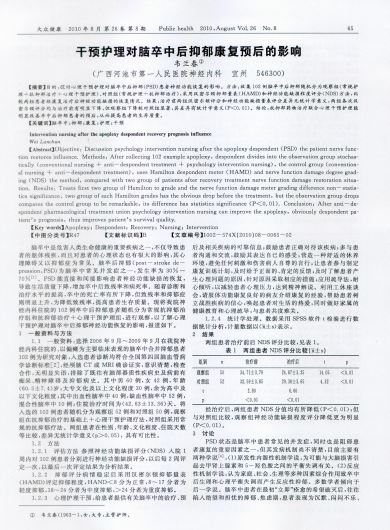干预护理对脑卒中后抑郁康复预后的影响(1)
 |
| 第1页 |
参见附件。
【摘要】目的:探讨心理干预护理对脑卒中后抑郁(PSD)患者神经功能恢复的影响。方法:收集102例脑卒中后抑郁随机分为观察组(常规护理+抗抑郁治疗+心理干预护理)、对照组(常规护理+抗抑郁治疗),采用汉密尔顿抑郁量表(HAMD)和神经功能缺损程度评分(NDS)方法,比较两组患者经康复治疗后神经功能缺损的恢复情况。结果:治疗前两组汉密尔顿评分和神经功能缺损量表评分差异无统计学意义,两组各次汉密尔顿评分均与治疗前有明显下降,但观察组下降较对照组显著,其差异有统计学意义(P<0.01)。结论:抗抑郁药物治疗联合心理干预护理能明显改善卒中后抑郁患者的预后,从而提高患者的生存质量。
【关键词】脑卒中;抑郁;康复;护理;干预
Intervention nursing after the apoplexy despondent recovery prognosis influence
Wei Lanchun
【Abstract】Objective: Discussion psychology intervention nursing after the apoplexy despondent (PSD) the patient nerve function restores influence. Methods: After collecting 102 example apoplexy, despondent divides into the observation group stochastically (conventional nursing + anti-despondent treatment + psychology intervention nursing), the control group (conventional nursing + anti-despondent treatment), uses Hamilton despondent meter (HAMD) and nerve function damage degree grading (NDS) the method, compared with two group of patients after recovery treatment nerve function damage restoration situation ......
您现在查看是摘要介绍页,详见PDF附件。